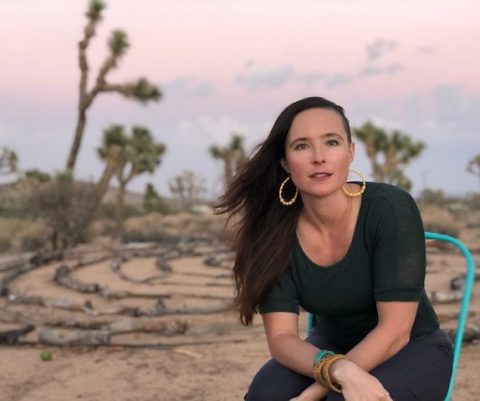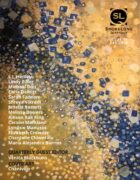“Foldable Essay With Wet Bee” feels textural to me, folding together like a fan. When you first conceived of this piece, did the idea that it was foldable come first? Or later? And what do you hope to achieve with this structure?
I’ll start by saying that I am also a mixed-media artist with a focus on collage—growing up in the Mojave Desert of Southern California with sharp plants, boulders, crystals, and all the trash brought in by the wind attracted me to the textural quality of collage. My poetry is full of “things” and so is my creative nonfiction. For micro nonfiction, which is a genre I’m new to, I want form and meaning to be very much interconnected the way it is with poetry. I want the images to tell the story. While I didn’t initially conceive of the essay as folding, I knew I wanted to begin with the memory of my grandmother folding to the floor in her final days, and I knew that I wanted the piece to have a collage-like texture. I wanted the reader to feel the emotional collapsing and ultimately the expanding that comes with losing a loved one. If we can fold, we can unfold, and open our hearts wider.
Can you talk a bit about that beautiful first section (fold?) and the parallel between the fragile grandmother and the drowning bee?
My grandmother was a kindergarten teacher for thirty years and a very tender soul. She took every opportunity to show me how to care for things. When I’d visit her as a young child, we’d rescue bees from her pool and set them in the sun to dry. Sometimes the bees would take flight again, and sometimes they didn’t. Anyone who has witnessed the dying process knows that there are times when it seems the dying person (or animal) is going to rally for a few more days or weeks. When we waited to see what the bees would do, my grandmother was teaching me how to bear witness—she was unknowingly preparing me for her own death.
This is such an emotional piece. How much time do you need to write like this about something so personal and poignant?
I think the best answer is, “As long as it takes.” She passed away the day before Mother’s Day in 2015 and I started working on this piece in 2020. Watching her go through inflammatory breast cancer (her second bought) in her mid-eighties and seeing the wound on her chest, which grew larger and larger, and often being the one to medicate it, presented a whole network of lessons about the body and about love that I’m still unpacking. Then there are all the lessons that came from her ability to enjoy life despite the incredible pain she must have been in. I tend to wait for an experience to feel less personal—for a loss to be less about my own suffering—before I write about it in earnest.
Do you recognize in yourself any of your grandmother’s character traits? And how old were you when she was your teacher? What was that like?
Yes, for sure. She was able to see a situation from a multitude of perspectives, which I think means that she had heaps of empathy. Though she wasn’t a writer or artist per se, she had the emotional intelligence that good writing and art require. Unlike many of her friends in her age group, she remained curious about all things. Without flattering myself too much, I think we share these traits. And she passed down her love of dancing, too. I visited her kindergarten class starting at a very young age—probably three or so. She held her students in wonder, like a magician, but the magic was real. Of course I had the benefit of meeting her when she was older and wiser.
Life, with all its textures—sound, smell, taste, touch, sight—is here, but so is danger, and fear, and death. It’s all here in such a way that I’m struck by its interconnectedness. Is that your intent?
Yes, definitely, and I’m so pleased that you picked up on those additional, darker textures. Originally, in the final fold, I’d written a line about my “inherited risk.” I ultimately took it out and hoped that the images of danger, fear, and death, as you mentioned, would speak for themselves. I chose not to directly mention my own personal health concerns in the piece—I trusted that a careful reader would pick up on the feelings you mentioned. I think that with micro-nonfiction, feeling is more important than getting in all the facts. I also wanted for people to consider their own mortality without too much of my personal history getting in the way.



 The SmokeLong Grand Micro Contest (The Mikey) is now an annual competition celebrating and compensating the best micro fiction and nonfiction online.
The SmokeLong Grand Micro Contest (The Mikey) is now an annual competition celebrating and compensating the best micro fiction and nonfiction online.